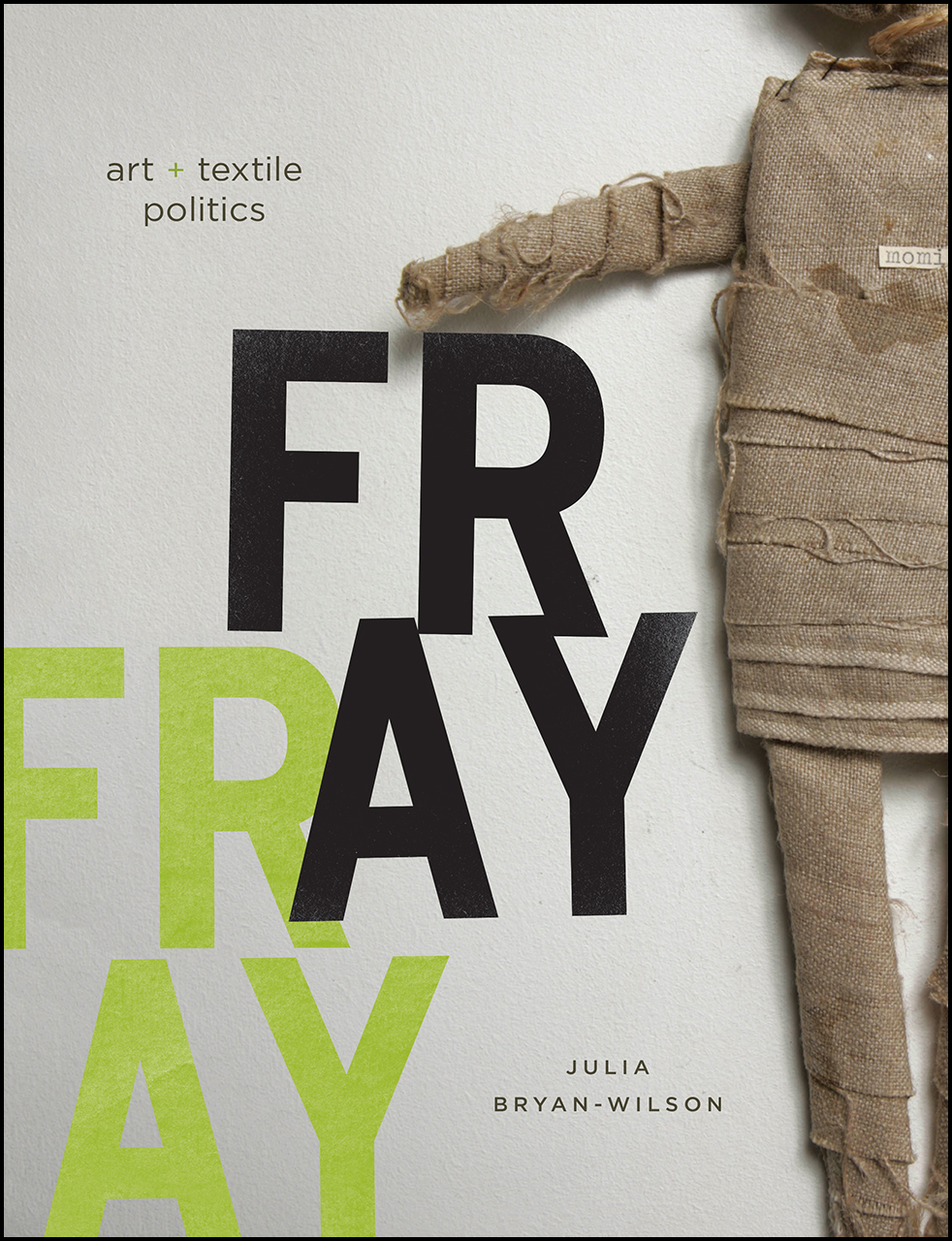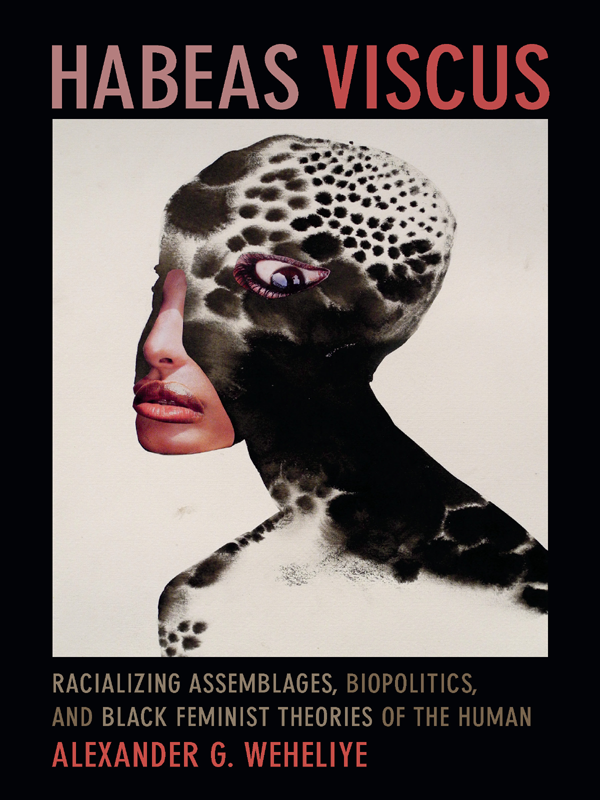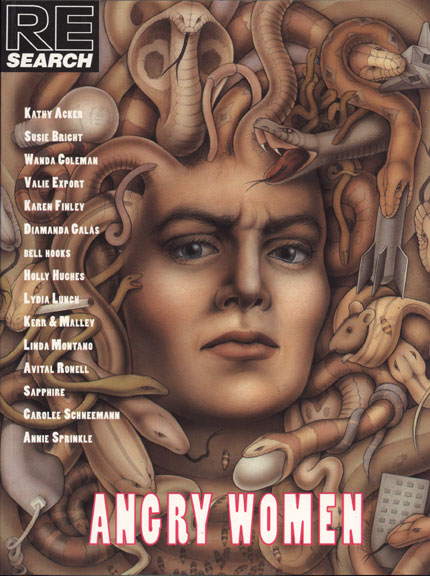Julia Bryan-Wilson: Fray: Art and Textile Politics (2017)
Filed under book | Tags: · activism, aids, art, art criticism, art history, craft, feminism, fiberwork, folk art, gender, handmaking, labour, politics, queer, quilting, race, textile, textile design, weaving

“In 1974, women in a feminist consciousness-raising group in Eugene, Oregon, formed a mock organization called the Ladies Sewing Circle and Terrorist Society. Emblazoning its logo onto t-shirts, the group wryly envisioned female collective textile making as a practice that could upend conventions, threaten state structures, and wreak political havoc. Elaborating on this example as a prehistory to the more recent phenomenon of “craftivism”—the politics and social practices associated with handmaking—Fray explores textiles and their role at the forefront of debates about process, materiality, gender, and race in times of economic upheaval.
Closely examining how amateurs and fine artists in the United States and Chile turned to sewing, braiding, knotting, and quilting amid the rise of global manufacturing, Julia Bryan-Wilson argues that textiles unravel the high/low divide and urges us to think flexibly about what the politics of textiles might be. Her case studies from the 1970s through the 1990s—including the improvised costumes of the theater troupe the Cockettes, the braided rag rugs of US artist Harmony Hammond, the thread-based sculptures of Chilean artist Cecilia Vicuña, the small hand-sewn tapestries depicting Pinochet’s torture, and the NAMES Project AIDS Memorial Quilt—are often taken as evidence of the inherently progressive nature of handcrafted textiles. Fray, however, shows that such methods are recruited to often ambivalent ends, leaving textiles very much “in the fray” of debates about feminized labor, protest cultures, and queer identities; the malleability of cloth and fiber means that textiles can be activated, or stretched, in many ideological directions.
The first contemporary art history book to discuss both fine art and amateur registers of handmaking at such an expansive scale, Fray unveils crucial insights into how textiles inhabit the broad space between artistic and political poles—high and low, untrained and highly skilled, conformist and disobedient, craft and art.”
Publisher University of Chicago Press, 2017
ISBN 9780226077819, 0226077810
326 pages
via slowrotation
Reviews: Holland Cotter (New York Times, 2017), Barbara Wisnoski (J Canadian Art History, 2018), Alexa Griffith Winton (J Design History, 2019), Janis Jefferies (Art Bulletin, 2019), Elizabeth S. Hawley (Winterthur Portfolio, 2019), Jayme Collins (InVisible Culture, 2019), Jason Edwards (Sculpture J, 2019), Katarzyna Falęcka (J Visual Culture, 2021).
Video interview with author (with Lynne Cooke, NGA, 60 min, 2017)
PDF (18 MB)
Comment (0)Alexander G. Weheliye: Habeas Viscus: Racializing Assemblages, Biopolitics, and Black Feminist Theories of the Human (2014)
Filed under book | Tags: · assemblage, bare life, biopolitics, black people, feminism, freedom, human, property, race, racialization, racism, slavery, theory

“Habeas Viscus focuses attention on the centrality of race to notions of the human. Alexander G. Weheliye develops a theory of ‘racializing assemblages,’ taking race as a set of sociopolitical processes that discipline humanity into full humans, not-quite-humans, and nonhumans. This disciplining, while not biological per se, frequently depends on anchoring political hierarchies in human flesh. The work of the black feminist scholars Hortense Spillers and Sylvia Wynter is vital to Weheliye’s argument. Particularly significant are their contributions to the intellectual project of black studies vis-à-vis racialization and the category of the human in western modernity. Wynter and Spillers configure black studies as an endeavor to disrupt the governing conception of humanity as synonymous with white, western man. Weheliye posits black feminist theories of modern humanity as useful correctives to the ‘bare life and biopolitics discourse’ exemplified by the works of Giorgio Agamben and Michel Foucault, which, Weheliye contends, vastly underestimate the conceptual and political significance of race in constructions of the human. Habeas Viscus reveals the pressing need to make the insights of black studies and black feminism foundational to the study of modern humanity.”
Publisher Duke University Press, Durham, 2014
ISBN 9780822356912, 0822356910
x+209 pages
Reviews: Ashon Crawley (LARB, 2015), Marianna Szczygielska (Parallax, 2015), Aditi Surie von Czechowski (Comp Stud South Asia, Africa and Middle East, 2015), Marianela Munoz and Charles Holm (Afro-Paradise, 2015), Megan H. Glick (Hypatia Rev, 2015), Shelleen Greene (Somatechnics, 2016), Amber Jamilla Musser (philoSOPHIA, 2016), Gabriela Radulescu (Allegra Lab, 2016), Ander Mendiguren Nebreda (Athenea Digital, 2017, ES).
Comment (0)Re/Search, 13: Angry Women (1991)
Filed under magazine | Tags: · feminism, interview, performance, race, sexuality, women

“In this illustrated, interview-format volume, 16 women artists address the volatile issues of male domination, feminism, race and denial. Among the modern warriors here are Diamanda Galas, a composer of ritualistic ‘plague masses’ about AIDS who refuses to tolerate pity or weakness; Lydia Lunch, a self-described ‘instigator’ who explains that her graphic portrayals of exploitation stem from her victimization as a child; and Wanda Coleman, a poet who rages against racism and ignorance. Goddess worshipper and former porn star Annie Sprinkle enthusiastically promotes positive sexual attitudes; bell hooks discusses societal power structures in terms of race and gender; Holly Hughes, Sapphire and Susie Bright expound on lesbianism and oppression; pro-choice advocates Suzy Kerr and Dianne Malley describe their struggles for reproductive rights.”
Interviews with Kathy Acker, Susie Bright, Wanda Coleman, Valie Export, Karen Finley, Diamanda Galás, Bell Hooks, Holly Hughes, Lydia Lunch, Kerr & Malley, Linda Montano, Avital Ronell, Sapphire, Carolee Schneemann, and Annie Sprinkle.
The magazine was later translated into German, Chinese and Japanese.
Edited by Andrea Juno and V. Vale
Publisher Re/Search, San Francisco, 1991
239 pages
PDF (138 MB)
Comments (3)
